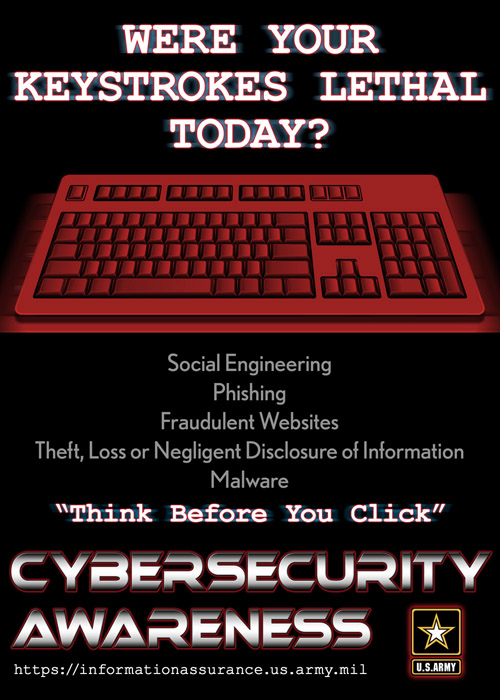Taking Cyber Security Seriously, and Personally
October's Nation-wide claim to fame is Halloween, but for years scary fantasy characters of the holiday, such as goblins and ghosts, have outshined another, more critical fear: cyber threats.
October 2014 marks the 11th Annual National Cyber Security Awareness Month, sponsored by the Department of Homeland Security in cooperation with the National Cyber Security Alliance and the Multi-State Information Sharing and Analysis Center.
A group within the U.S. Army Medical Research and Materiel Command's team of information technology specialists maintains the expertise to identify and eliminate cyber security threats, such as hacking, identify theft, espionage, crime and terrorism.
The IT office, led by the USAMRMC Deputy Chief of Staff for Information Management and Chief Information Officer Barbara McFadden, is conducting an educational campaign this month to support the effort of raising awareness of cyber threats and security measures.
Throughout the month, McFadden's team is distributing weekly fact sheets, security posters and additional security training resources to ensure all USAMRMC personnel are well informed about the risks and some of the ways they can help mitigate those risks.
"We are constantly being threatened by outsiders. In our daily monitoring, within the USAMRMC arena, we get a few attacks a week, but our country gets attacked hundreds of thousands of times a day," said McFadden. "But an attack is different from a penetration. We don't often get penetrated, but we have been before."
The U.S. Army's cyber security theme this year, "Lethal Keystrokes," emphasizes the individual's responsibility to protect the network by weighing each action taken on a system and considering its consequences.
"Attackers are looking for a way to get in. The smallest thing we do could give someone a window to get in, and once they're in they have the ability to move around," said McFadden. "And we're not talking about people who don't know what they're doing. They're trained hackers."
According to McFadden, everyone can be a cyber security professional, meaning everyone maintains the same responsibility to be aware of threats and take the appropriate security measures.
"Every person has a critical role in protecting our networks. Everyone has to play a role in making sure we're able to not only protect the Army but maintain our national security too," said McFadden.
The challenge of communicating the importance of taking secure actions online only grows as new software and technology continue to emerge. The IT office's mission is to balance the workforce's mission with security while ensuring customer satisfaction, including providing the latest and greatest tools.
As smartphones make their way into the government arena, employees need to take more precaution than ever and keep a close hold on their personal information.
"When we get a request from someone to use a certain application or run a certain program, we don't want to say no; we try to have a 'yes' answer, but we need to meet our requirements first for security and consider the impact to the organization and the Nation," said McFadden.
As you make keystrokes throughout your day in completing work for your organization's mission, keep the DHS's simple tips at the top of your mind to ensure you're fulfilling your role in protecting the Nation:
- Set strong passwords and don't share them with anyone.
- Keep your operating system, browser and other critical software optimized by installing updates.
- Maintain an open dialogue with your family, friends and community about Internet safety.
- Limit the amount of personal information you post online and use privacy settings to avoid sharing information widely.
- Be cautious about what you receive or read online -- if it sounds too good to be true, it probably is.
Report anything suspicious you encounter online. It never hurts to report something, even if it is actually harmless.
 An official website of the United States government
An official website of the United States government
 ) or https:// means you've safely connected to the .mil website. Share sensitive information only on official, secure websites.
) or https:// means you've safely connected to the .mil website. Share sensitive information only on official, secure websites.



